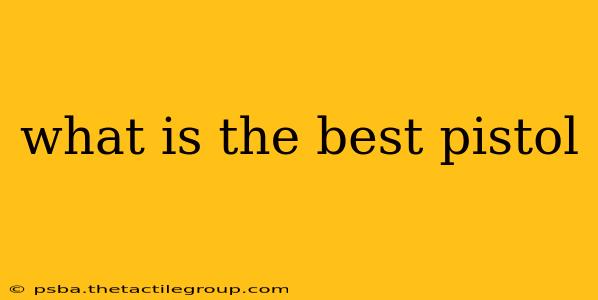What's the Best Pistol? It Depends on Your Needs
The question, "What's the best pistol?" is deceptively simple. There's no single "best" pistol because the ideal firearm depends entirely on individual needs, experience, and intended use. Choosing the right pistol requires careful consideration of several key factors. This guide will help you navigate those factors and determine what might be the best pistol for you.
Key Factors to Consider When Choosing a Pistol
Before diving into specific models, let's outline the crucial factors that influence pistol selection:
1. Intended Use:
- Self-Defense: For personal protection, reliability, ease of use, and stopping power are paramount. Smaller, lighter pistols might be preferable for concealed carry, while larger models offer greater capacity and stopping power.
- Competition: Accuracy, ergonomics, and trigger characteristics are key in competitive shooting. Specific features like adjustable sights and high-capacity magazines are common.
- Hunting/Sport Shooting: Power, accuracy, and reliability are critical for hunting small game or participating in sport shooting disciplines. Caliber choice becomes even more significant here.
- Law Enforcement: Reliability, durability, and high capacity are essential for law enforcement applications. Often, agencies standardize on specific models for ease of training and maintenance.
2. Caliber:
The caliber (the diameter of the bullet) significantly impacts the pistol's power, recoil, and suitability for different purposes:
- 9mm: A popular and versatile round, offering a good balance of power, accuracy, and manageable recoil. Widely available and relatively inexpensive ammunition.
- .45 ACP: A larger, more powerful round with significant stopping power, but with more noticeable recoil.
- .40 S&W: A compromise between 9mm and .45 ACP, offering moderate power and recoil.
- .380 ACP: A smaller, lower-powered round often preferred for concealed carry due to its reduced recoil and size.
3. Size and Weight:
- Compact/Subcompact: Easy to conceal but might have reduced capacity and slightly less comfortable shooting ergonomics.
- Full-Size: Offer greater accuracy, capacity, and comfort during shooting sessions, but are less easily concealed.
4. Ergonomics and Handling:
The pistol should fit comfortably in your hand. Consider the grip angle, texture, and overall feel. A good grip is crucial for accuracy and control.
5. Reliability:
The pistol should function flawlessly under various conditions. Choose a reputable manufacturer with a history of producing reliable firearms.
6. Features:
Consider features such as:
- Sights: Quality sights are crucial for accuracy. Night sights are beneficial for low-light situations.
- Safety features: Understand and be comfortable with the safety mechanisms of the pistol you choose.
- Trigger: A smooth, consistent trigger pull is important for accuracy and safety.
Examples of Popular Pistols (Note: This is not an exhaustive list and does not constitute a recommendation):
Many reputable manufacturers produce high-quality pistols. Some popular examples include Glock, Sig Sauer, Smith & Wesson, Beretta, and Springfield Armory. Research each manufacturer's specific models to determine which best suits your needs.
Conclusion: Research is Key
Ultimately, the "best" pistol is subjective. Thorough research, consideration of your individual needs, and potentially hands-on experience at a shooting range are crucial before making a purchase. Consult with experienced shooters and professionals, and never hesitate to seek further information before deciding on a firearm. Safe and responsible firearm ownership is paramount. Remember to always follow local and state laws regarding firearm ownership and usage.

